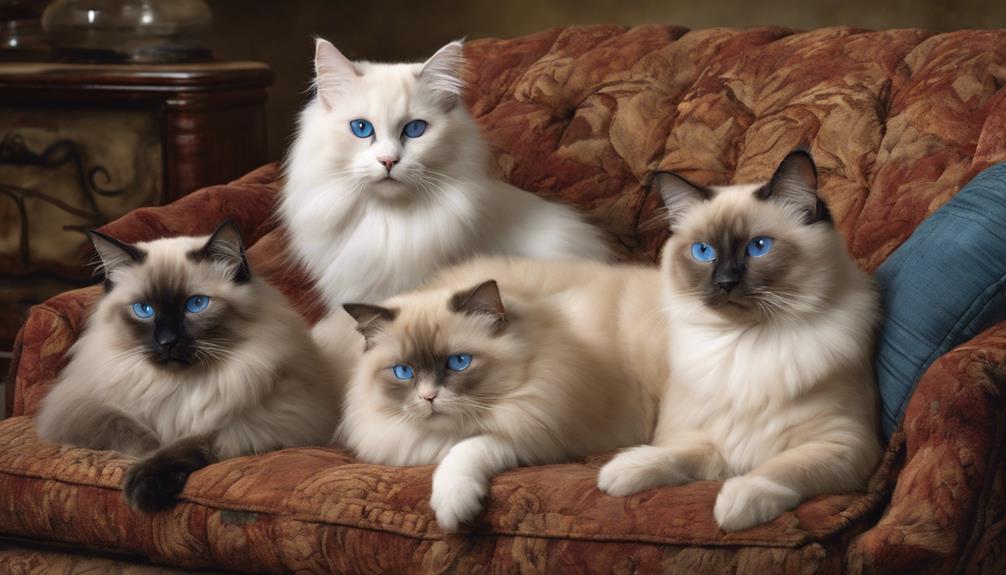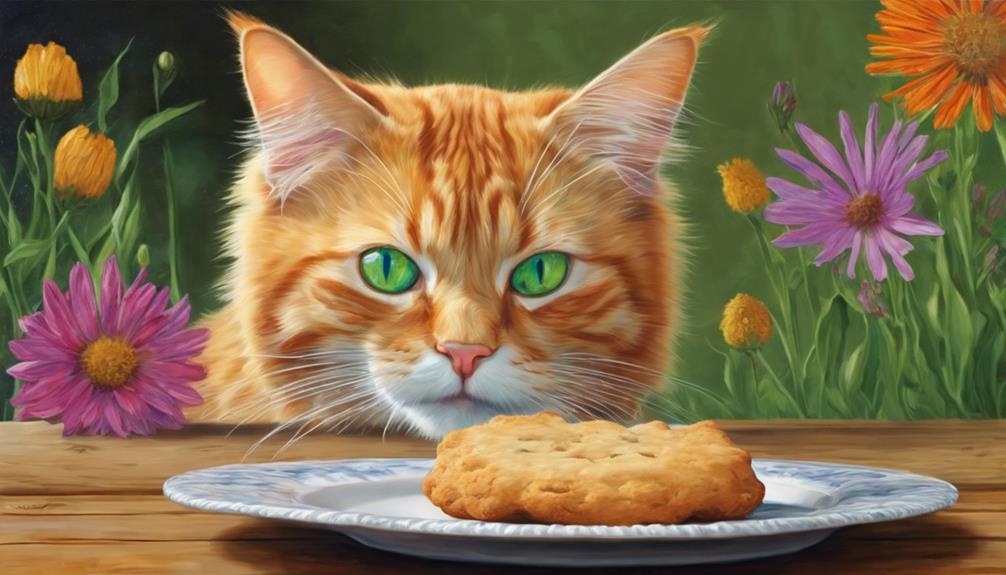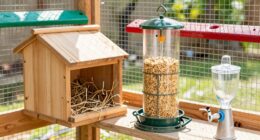Cats can munch on cantaloupe, honeydew, and seedless watermelon safely. These melons pack vitamins A and C. Chop melon into tiny bits to prevent choking. Skip the seeds and rind. Start slow to watch their reaction. Melon boasts fiber and hydration benefits. It's not crucial. Moderation matters for sugar and weight. Watch for seeds' cyanide and choking hazards. Monitor high fiber effects. Know melon isn't essential but can be fun. Small bites keep cats happy. Ready for more tips to treat your feline friend?
Key Takeaways
- Safe melon types for cats include cantaloupe, honeydew, and seedless watermelon.
- Remove all seeds and rind to prevent choking hazards and digestive issues.
- Monitor cat for allergic reactions or digestive upsets when introducing melon.
- Melon can be an occasional treat for cats, offering vitamins A and C.
- Consult a vet if your cat accidentally ingests melon seeds for immediate attention.
Melon and Cats
When dealing with cats and melon, it's important to provide small pieces of cantaloupe, honeydew, or seedless watermelon as safe treats. Cats can eat watermelon, and while they may not derive significant nutritional benefits from it, there are still some health benefits to take into account. Melon is rich in vitamins A and C, which can contribute to a cat's overall health and well-being. These vitamins support their immune system, skin health, and vision.
Feeding cats melon in moderation can be a fun way to introduce a new treat into their diet. However, it's crucial to remember to remove any seeds and rind from the melon before offering it to your feline friend to prevent any choking hazards. Introduce new foods like melon gradually to monitor for any adverse reactions in your cat. Overall, offering small pieces of melon can be a safe and enjoyable snack for your furry companion, adding a touch of variety to their diet.
Nutritional Benefits of Melon

Melon offers valuable nutritional benefits to cats, including high fiber content and essential vitamins A and C. These nutrients play an important role in supporting a cat's overall health and well-being.
Additionally, the water content in melon can help with adequate hydration for your feline friend. While melon does provide some potassium, it isn't a significant source of this mineral for cats.
It's worth mentioning that despite these nutritional benefits, melon should be given to cats in moderation. This is because melon also contains sugar, and overfeeding it to your cat can lead to weight gain and potential digestive issues.
Hence, offering melon as an occasional treat can be a beneficial and nutritious addition to your cat's diet. Remember, moderation is key when sharing this juicy fruit with your beloved feline companion.
Risks of Feeding Melon to Cats

Feeding cats melon poses potential risks due to the presence of toxic cyanide in the seeds, which can lead to serious health issues if consumed. It's important to remove all seeds before offering this fruit to your feline friend.
Opt for seedless melon to keep them safe and avoid any choking hazards. Additionally, be mindful of the rind, as it can cause intestinal blockages or upset stomach in cats.
While melon can be a revitalizing treat, it's not a necessary part of their diet and should be given in moderation to prevent any potential digestive issues.
Melon Varieties Safe for Cats
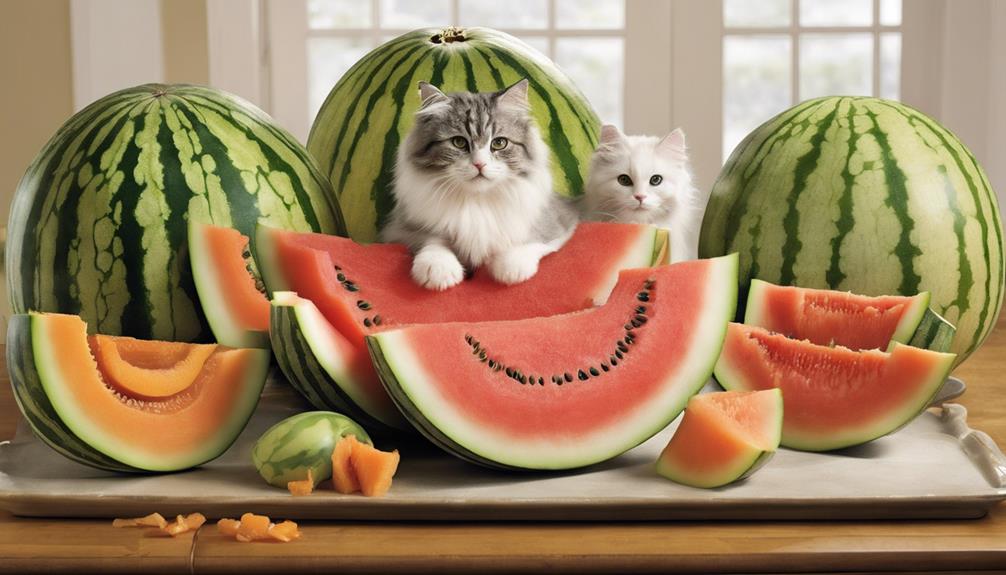
When it comes to melon varieties safe for cats, options like cantaloupe, honeydew, and seedless watermelon are good choices.
These melons are packed with essential vitamins A and C, which can contribute to your cat's overall well-being.
Remember to always remove any seeds and rind from the melon before offering it to your feline friend to avoid potential choking hazards.
Safe Melon Types
We've discovered that certain types of melons aren't only safe for cats but also offer beneficial vitamins for their health. Cats can enjoy varieties like cantaloupe, honeydew, and seedless watermelon. These melons are packed with vitamins A and C, which contribute to a healthy feline diet.
When offering melon to cats, remember to cut it into small, manageable pieces to prevent choking hazards. It's important to avoid feeding cats the seeds and rind of melons. Introduce melon gradually to your furry friend and keep an eye on their reaction to make sure they tolerate it well.
With these precautions in mind, you can treat your cat to a tasty and nutritious snack of safe melon types.
Melon Serving Tips
For cat owners looking to offer their feline companions a tasty and nutritious treat, certain melon varieties like cantaloupe, honeydew, and seedless watermelon are safe options rich in vitamins A and C. When serving watermelon to your cat, remember to remove the seeds to prevent any choking hazards. To make it easier for your cat to enjoy, cut the melon into small, bite-sized pieces. Here's a handy table to help guide you on the safe melon varieties for your cat:
| Melon Variety | Safe for Cats |
|---|---|
| Cantaloupe | Yes |
| Honeydew | Yes |
| Seedless Watermelon | Yes |
Precautions When Feeding Cats Melon
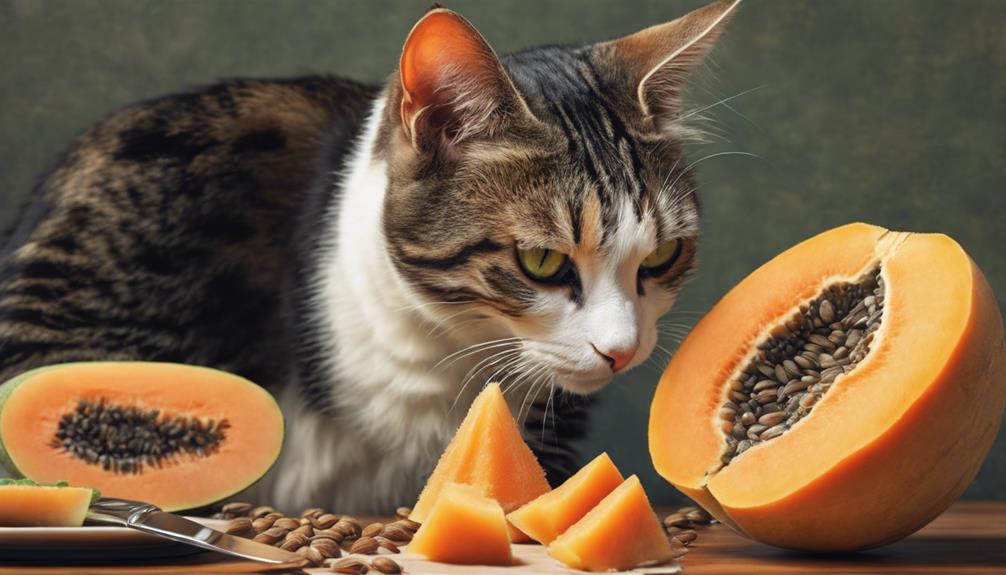
When feeding cats melon, it's important to remove all seeds and rind to prevent any choking hazards.
Cats may experience tummy upset from the high fiber content in melon, so it's important to monitor their reaction.
Additionally, cats with weight issues or diabetes should avoid melon due to its sugar content.
Melon and Cat Safety
When feeding melon to cats, it is crucial to always remove the seeds and rind to prevent any potential choking hazards or digestive issues. Cats can enjoy melon safely if prepared correctly. To guarantee your feline friend stays healthy, follow these precautions:
| Precautions | Details |
|---|---|
| Eliminate seeds and rind | Prevent choking and digestive problems. |
| Cut into small pieces | Ensure safe consumption for cats. |
| Monitor sugar intake | Cats with weight issues or diabetes should avoid it. |
| Introduce gradually | Watch for any adverse reactions in your cat. |
| Avoid rinds | Can cause blockages or upset stomach in cats. |
Melon Serving Size
To ensure safe consumption for cats, always provide melon in small, bite-sized pieces to prevent choking hazards. Cats eat small pieces more easily and reduce the risk of any digestive problems.
Remember to remove the rind and seeds from melon before offering it to your feline friend. It's essential to monitor your cat for any signs of stomach upset after introducing melon into their diet.
Due to its high fiber content, cats should only consume melon in moderation. Be mindful that cats with weight problems or diabetes should avoid melon due to its sugar content.
Melon Allergy Risk
In introducing melon to cats, it's important to monitor for any signs of allergic reactions, as rare cases of melon allergies can occur. Cats with a history of food allergies should approach melon cautiously. Symptoms of a melon allergy in cats may manifest as vomiting, diarrhea, or skin reactions. If you suspect your cat is having an allergic reaction to melon, consulting a veterinarian is advisable.
While melon is generally safe for cats, it's vital to watch for any signs of discomfort or allergic responses. Gradually introducing melon into your cat's diet can help mitigate the risk of allergies and allow you to observe any adverse reactions. Remember, your cat's well-being is a top priority when exploring new foods like melon.
Melon Serving Suggestions for Cats
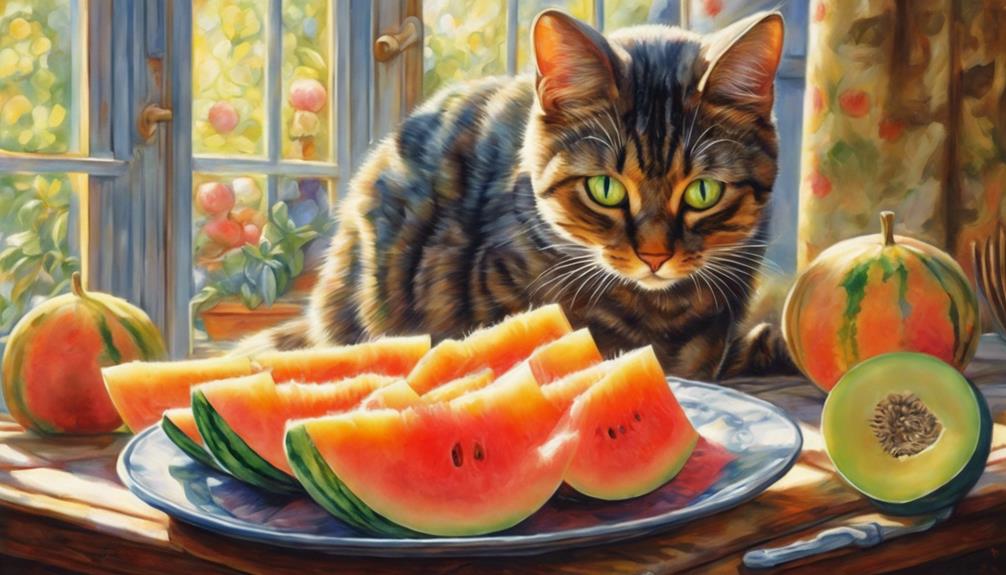
For cats, it is best to cut melon into small, bite-sized pieces to facilitate easy consumption. When serving melon to your feline friend, remember to remove all seeds to prevent any choking hazards. It's important to avoid feeding cats the rind of the melon as it can lead to digestive issues. Monitoring your cat closely when introducing melon to their diet is essential to watch for any adverse reactions. Additionally, limit the amount of melon you give to your cat to avoid potential stomach upset.
Here is a handy table to help you serve melon to your cat:
| Melon Serving Suggestions for Cats | Amount |
|---|---|
| Cut into small pieces | 1-2 tsp |
| Remove all seeds | – |
| Avoid feeding the rind | – |
| Monitor for adverse reactions | – |
| Limit quantity | Small |
Moderation in Melon Consumption

Melon consumption by cats should be carefully regulated to prevent potential digestive issues. While melon can be a good treat for your feline friend, it's important to remember that moderation is key when it comes to introducing new foods.
Cats can enjoy small pieces of cantaloupe, honeydew, or seedless watermelon as occasional treats, but overfeeding can lead to stomach upset due to the high fiber content in melon. For cats with weight problems or diabetes, it's especially important to limit their melon consumption.
When offering melon to your cat, make sure to do so gradually and monitor their reaction closely to guarantee that they tolerate it well. By being mindful of how much melon your cat consumes and paying attention to their individual needs, you can incorporate this fruit into their diet as a special and occasional treat without causing any harm.
Melon Allergies in Cats
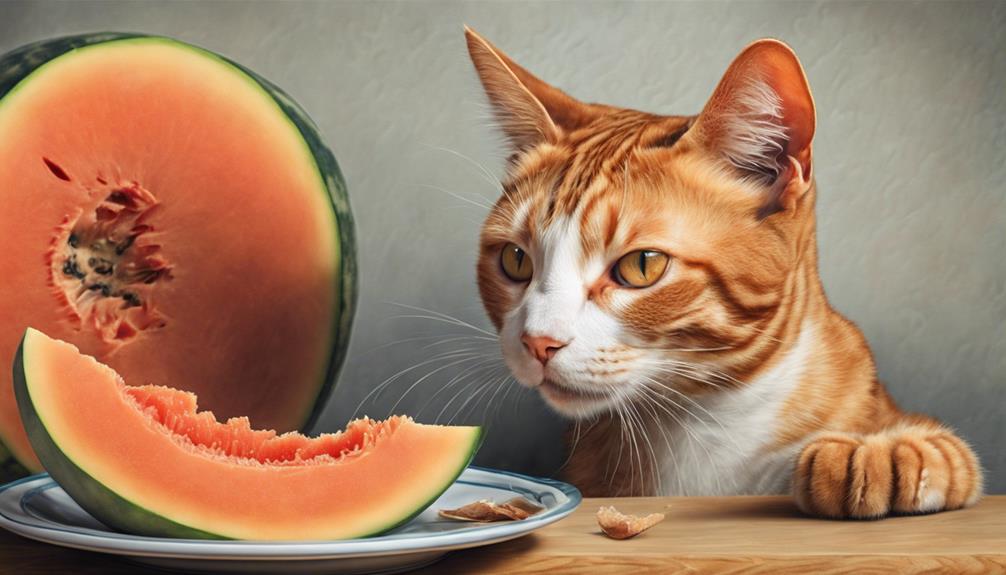
Rarely do cats develop allergies to melon due to its low vital potential, but when they do, symptoms can range from itching and skin redness to gastrointestinal issues. While melon is generally safe for cats, allergic reactions can occur, manifesting in various ways. It's important to observe your feline friend for any unusual signs after they consume melon.
If you notice symptoms like itching, redness, or digestive problems, it could indicate an allergic reaction. Allergic reactions in cats can vary in severity, so it's essential to consult with a veterinarian if you suspect your cat is having an adverse response to melon. Veterinary professionals can perform tests to identify specific food allergies, including melon, through methods like elimination diets or blood tests.
When it comes to your cat's health, being attentive to any potential allergic reactions is key to ensuring their well-being.
Melon as Occasional Cat Treat

Melon can be a delightful occasional treat for our feline friends, offering an invigorating and tasty snack option. While melon may not provide significant nutritional benefits for cats, it can still be a fun and safe treat to offer in moderation.
Remember to cut the melon into small, manageable pieces to prevent any potential choking hazards and introduce it gradually to monitor your cat's digestion.
Cats Digestive System
With their sensitive digestive system, cats may not process melon well if given in large quantities, making it important to offer this fruit only as an occasional treat due to its high sugar content. Cats' diet plays a vital role in their overall health, and while a small amount of melon can be a delightful treat, moderation is key.
Too much melon can lead to digestive issues like diarrhea, especially with its fiber content. Cats with weight problems or diabetes should steer clear of melon treats to maintain their well-being. When introducing melon to your cat, do so gradually to monitor how their digestive system reacts.
Melon Nutritional Value
Considering its low calorie content and high vitamin A and C levels, melon can be a nutritious and rejuvenating occasional treat for cats. Cats can benefit from the vitamins found in melon, contributing to a balanced diet.
The hydration provided by melon, thanks to its water content, can be revitalizing for our feline friends. Additionally, offering melon in small, bite-sized pieces can give cats a tasty snack that also contains dietary fiber, aiding in digestion when given moderately.
Remember that while melon can be a healthy addition to a cat's diet, it shouldn't replace their primary meat-based meals. Including melon as an occasional treat can provide cats with a boost of essential vitamins and a delicious change of pace.
Serving Size Recommendations
When providing melon to cats as an occasional treat, it's important to be mindful of the serving size to prevent digestive issues and ensure their safety.
Here are some tips for serving melon to your feline friend:
- Limit the amount of melon to small, bite-sized pieces to prevent digestive upset.
- Always remove the seeds and rind before offering melon to your cat to avoid choking hazards.
- Cats with weight issues or diabetes should only have melon in moderation.
- Introduce melon gradually to monitor for any adverse reactions in your cat.
- Remember that melon should only be a small part of their diet, so offer it sparingly to maintain a balanced nutritional intake.
Melon Hydration for Cats
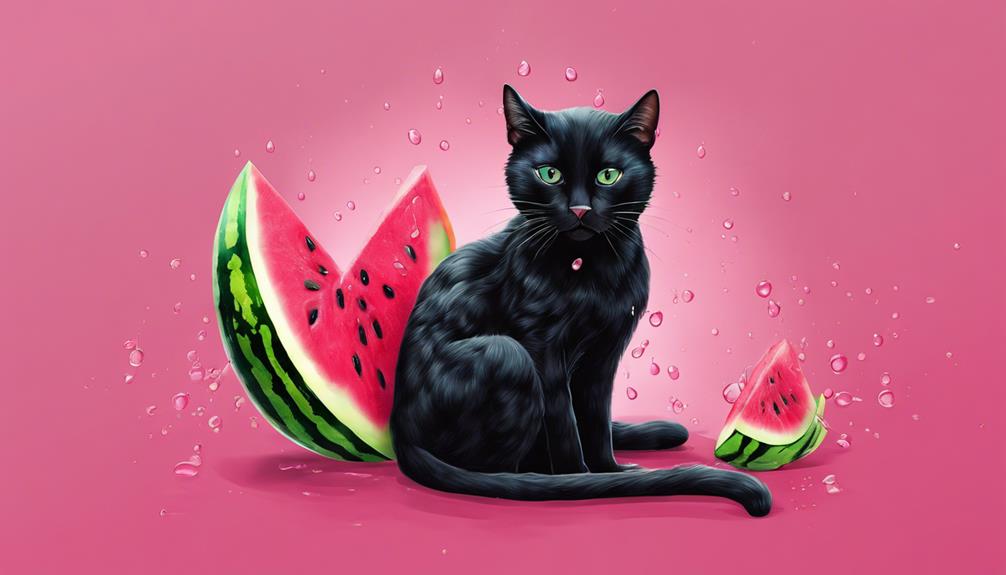
Melon's high water content makes it an excellent choice for keeping cats hydrated. Cats can benefit from the juicy goodness of melon in maintaining their hydration levels, making it a watermelon good, hydrating option. The water content in melon not only quenches their thirst but also helps prevent dehydration, a common issue among our feline friends. Cats often find the texture of melon appealing, and offering it as a treat can be a fun way to sneak in some extra moisture into their diet. It's like giving them a revitalizing snack that also serves as a source of hydration. Here's a handy table to illustrate the importance of melon in hydrating our beloved cats:
| Benefits of Melon Hydration for Cats |
|---|
| Helps prevent dehydration |
| Provides a rejuvenating source of moisture |
| Can be offered as a tasty treat to increase water intake |
Melon and Cat Digestive Health

With its high fiber content, melon can play a beneficial role in supporting a cat's digestive health. Cats can benefit from the hydration provided by the water content in melon, aiding in digestion and preventing constipation.
Introducing melon to a cat's diet gradually allows for monitoring any digestive reactions, ensuring the change is smooth and well-tolerated. Melon's fiber content can assist in regulating a cat's digestive system, promoting regular bowel movements and overall gut health.
It's important to remove seeds and rind from melon before feeding it to a cat to prevent any potential digestive issues like blockages or discomfort. By incorporating melon into your cat's diet mindfully, you can help support their digestive health while providing a tasty treat they may enjoy.
Melon Nutrients for Cats
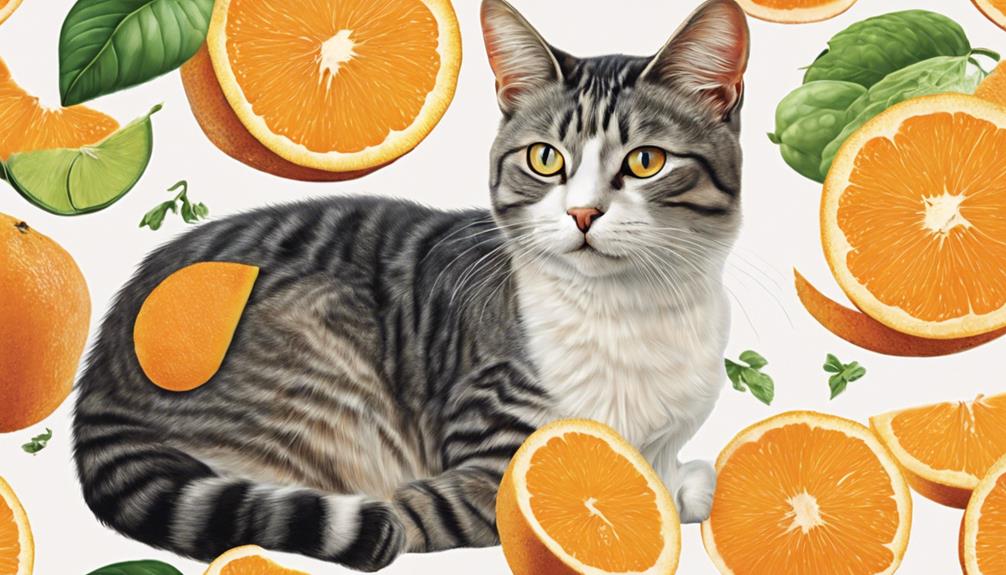
Rich in essential vitamins and hydration, melons like cantaloupe and honeydew offer valuable nutrients for cats. These fruits are packed with vitamin C, which plays an important role in supporting your feline friend's overall health. In addition to vitamin C, melons also contain vitamin A, contributing to your cat's well-being.
The high water content in melons can help keep your cat hydrated, especially during hot weather or if they've a low water intake. When given in small, cut-up pieces, melon can serve as an invigorating snack for your cat. The fiber present in melons can aid in digestion, promoting a healthy gut for your furry companion.
Since melon allergies are rare in cats, these fruits are generally considered safe for feline consumption. Remember, while melons offer great nutritional benefits, they should only be given to your cat in moderation, as they shouldn't make up a significant part of their diet.
Melon Seed Dangers for Cats
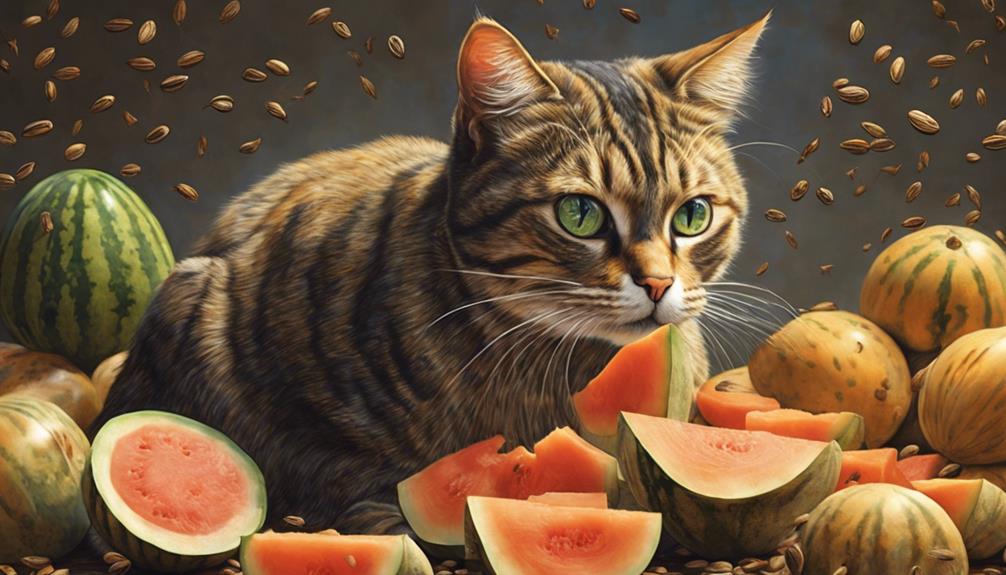
Melon seeds can be risky for cats due to their cyanide content, causing potential toxicity and oxygen intake issues. Additionally, these seeds pose a choking hazard and may lead to digestive system complications if ingested.
To keep cats safe, it's important to remove all seeds before offering melon as a treat.
Melon Seed Toxicity
Consuming melon seeds poses a serious health risk to cats due to the presence of cyanide, a toxic substance that can harm their respiratory system. Cats should steer clear of melon seeds to safeguard their well-being. To protect your feline friend, remember these key points:
- Avoidance is Key: Keep melon seeds away from cats at all times.
- Respiratory Risks: Cyanide in seeds can lead to breathing difficulties in cats.
- Seed Removal: Always remove seeds before offering melon as a treat.
- Health Precaution: Prevent potential cyanide poisoning by ensuring cats don't ingest seeds.
- Vet Awareness: Consult a vet immediately if your cat accidentally ingests melon seeds.
Stay vigilant and prioritize your cat's health by steering clear of melon seeds.
Potential Choking Hazard
When cats ingest melon seeds, they face a potential choking hazard due to the size and shape of the seeds. To highlight the risks associated with melon seeds, let's take a closer look at the dangers they pose:
| Melon Seed Dangers for Cats |
|---|
| 1. Choking Hazard |
| 2. Intestinal Blockages |
| 3. Cyanide Toxicity |
| 4. Importance of Removal |
| 5. Safety Precautions |
It's crucial to comprehend that these small seeds can be problematic if swallowed by our feline friends. To guarantee their safety, always opt for seedless melon or meticulously remove all seeds before offering this treat to your beloved cat. Remember, a little precaution goes a long way in safeguarding your pet's well-being.
Digestive System Implications
After highlighting the potential choking hazard of melon seeds for cats, let's now explore how ingesting these seeds can impact a cat's digestive system.
When cats consume melon seeds, it can lead to various digestive issues that may harm their well-being. Here are some implications to ponder:
- Ingesting melon seeds can cause an upset stomach in cats, leading to discomfort and potential vomiting.
- Melon seeds contain cyanide, which is toxic to cats and can have severe effects on their digestive system.
- Consumption of melon seeds may result in intestinal blockages, requiring immediate veterinary attention.
- To prevent digestive complications, always make sure melon offered to cats is seedless and free from potential hazards.
- Removing seeds and rind from melon before feeding your cat is pivotal to avoid any digestive disturbances.
Melon Rind Safety for Cats

To guarantee the safety of cats when providing melon, it's essential to be mindful of the potential risks associated with melon rinds. While the flesh of melon can be a rejuvenating and nutritious treat for our feline friends, the rind poses certain dangers that should be confirmed. Unlike melon flesh, which is safe for dogs and cats alike, the tough and fibrous nature of the rind can present hazards to our cats.
Cats may find it challenging to chew and swallow melon rinds, increasing the risk of choking. Additionally, their digestive systems may struggle to process the rind, potentially leading to intestinal blockages. These blockages can cause discomfort and require immediate veterinary attention.
As such, to guarantee the well-being of our beloved cats, it's vital to remove the rind before offering them melon. By doing so, we can prevent digestive issues and promote safe consumption of this delicious fruit. Remember, always prioritize your cat's health and happiness when sharing treats like melon with them.
Conclusion: Can Cats Enjoy Melon?

Considering the potential risks associated with melon rinds for cats, it's important to understand if they can genuinely enjoy the flesh of this fruit. Cats can indeed savor small pieces of melon like cantaloupe, honeydew, or seedless watermelon. Here are five reasons why offering melon to your feline friend can be a safe and occasional delight:
- Melon is rich in vitamins A and C, which can benefit your cat's health when given in moderation.
- Introducing melon gradually allows you to monitor any potential digestive reactions, especially vital for cats with weight or diabetes concerns.
- Removing the rind and seeds beforehand is essential to prevent choking hazards or digestive issues in cats.
- While melon isn't a necessary part of a cat's diet, it can serve as a rejuvenating and exciting treat for variety.
- Offering melon as an occasional indulgence can bring joy to your cat while providing some additional nutrients to their diet.
Frequently Asked Questions
Is It Safe for Cats to Eat Melon?
Eating melon is safe for cats. We confirm that melons like cantaloupe and honeydew are non-toxic and well-tolerated by cats. Remember to remove seeds and rind before feeding. It's a rare allergen, making it a generally safe treat.
Why Do Cats Love Melon?
We adore how cats crave melon! Its sweet scent and juicy allure captivate them. The crunch of cantaloupe delights their senses. Melon's hydration on hot days is a win. A treat for variety!
Are Any Fruits Toxic to Cats?
Fruits like grapes, raisins, and citrus are toxic to cats. It's vital to avoid these harmful foods. Always prioritize your cat's safety by researching what they can eat. Immediate veterinary care is essential if ingestion occurs.
Which Fruit Cat Can Eat?
We purrfectly approve peaches, pears, and pumpkins for your feline friend's fruity feast. Pick ripe options rich in nutrients. Proceed with caution, as some fruits, like grapes and raisins, are perilous for pets.
Can Cats Safely Eat Melon if They Can Have Whipped Cream Safely?
While cats and whipped cream safety may vary, it’s generally safe for cats to have small amounts of plain melon. However, cats and whipped cream safety aren’t necessarily indicative of melon safety. Always consult a vet before offering any new food to your feline friend.
Conclusion
To wrap up, cats can enjoy melon in moderation, much like how we savor a sweet treat on a hot summer day. While melon provides some nutritional benefits for our feline friends, there are risks to ponder, especially with seeds and rinds.
It's important to exercise caution and offer melon varieties that are safe for cats. Remember, a little melon can be a tasty snack for your furry companion, but always prioritize their health and well-being.




